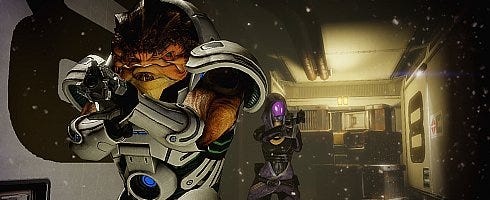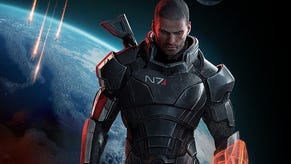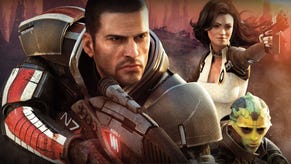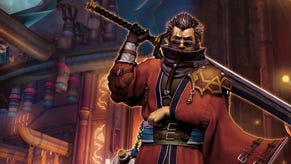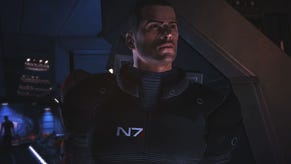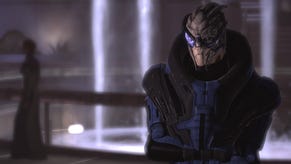Exclusive: VG247 talks Mass Effect 2 with associate producer Jesse Houston
Interview by Patrick Garratt.
Mass Effect 2 associate producer Jesse Houston sat down with VG247 during GamesCom to talk a bit about the game that everyone and their kitten is gagging to get their tiny paws on.
Seems the game has double the amount of physical content of the first one, combat is much smoother as everything's 30FPS, it will ship simultaneously for 360 and PC, and includes a new interrupt system.
There are loads of goodies in the interview, you should read on past the break.
VG247: You just mentioned that the game's shorter. Is that correct?
Jesse Houston: No, we're actually trying to make it around the same length as far as the play-time you would have experienced in the first one. That being said, some of our guys stripped through it really quickly, some of them took a lot longer. That being said, we find that you chew through content a little bit more quickly. The physical amount of content in the game is almost double this time round.
You mean in terms of visual assets?
Houston: Visual assets, dialogue, how conversations work: the game itself is absolutely huge.
You've obviously done a lot of work on combat. Is the control system more exact?
Absolutely. It's not just the control system. If you look at most good shooters, they lock down frame-rate at 30FPS: we've done the same thing. Bam. Everything's 30FPS, streaming is fixed up so that... If you remember in Mass 1, if you took a step backwards and you hit a weird stream and it'd pause for a moment. We've done a away with that. What you're seeing here is pulled straight from the game. It's not E3 Voodoo.
You'll feel that the controls, the animation and the FPS combine to make for a faster gameplay experience, and a smoother experience.
Some were some pretty significant differences in the controls between the PC and 360 versions last time round. Is it the same with the sequel?
We learned a lot from building the PC version before, and having built it six months later there was a big difference. So we actually took what we learned from PC and put it back into 360. Fundamentally, we want you to have the same gameplay experience, but just with the difference in controls. This time round, doing it at the same time for a sim-ship, we can control the differences much more smoothly because it's the same team building it now.
Do you enjoy being a in a position where you only have to worry about one console format?
Do you mean developing for just Xbox?
Yeah.
I actually don't personally. This is purely a personal thing, but I actually like the challenge of multi-SKU shipping. It makes you think more modularly, to think about your features as contained units and how they interact rather than the game as a whole and that's a better place to be in overall.
Story-telling was obviously a huge part of the first game. How have you advanced for the second game in terms of virtual acting?
Houston laughs
Short answer, then.
It's a lot more difficult than I originally anticipated. This is my first time round dealing with the digital acting side of Mass Effect, and it's definitely been one of the hardest things that I've personally had to deal with. We had great digital acting before. I believe was had some of the best in the industry, and I'm not trying to brag, or anything like that. We just pushed ourselves very hard to do that. We really had to sit down and take a hard look, and we looked at better facial animation, better integration between cut-scenes, cinematics and conversations... We react to the environment more cleverly.
We're doing new stuff that we'd never thought about doing before. You know, having conversations in cars, walking, having tons of people in [a conversation]. We'd never thought we were going to be able to do conversations with eight guys in them, but we do. Killing guys mid-way through conversations, this sort of thing. Obviously, there are visual improvements as well. We ripped out the lighting system and put in a new lighting system, and that affects the whole game, not just conversations, but it's really visible in the conversations, where we have some of our best-looking graphics. Just trying to bring everything up, then add new things. For example, we now have the interrupt system, which is the way we're trying to let players control the pace of conversations a little more, without having them just mashing the X button and lose the suspension of disbelief. We want to keep them there, but allow them to control the speed still.
What about the camera angles? Do you use people that are used to using physical cameras?
Absolutely. We have a number of departments of cinematic designers and cinematic animators, and all they do is deal with these conversations and the story-telling aspects. We sget a lot of these guys from film backgrounds. Our tools are based around film concepts.
Thanks for your time, Jesse.
